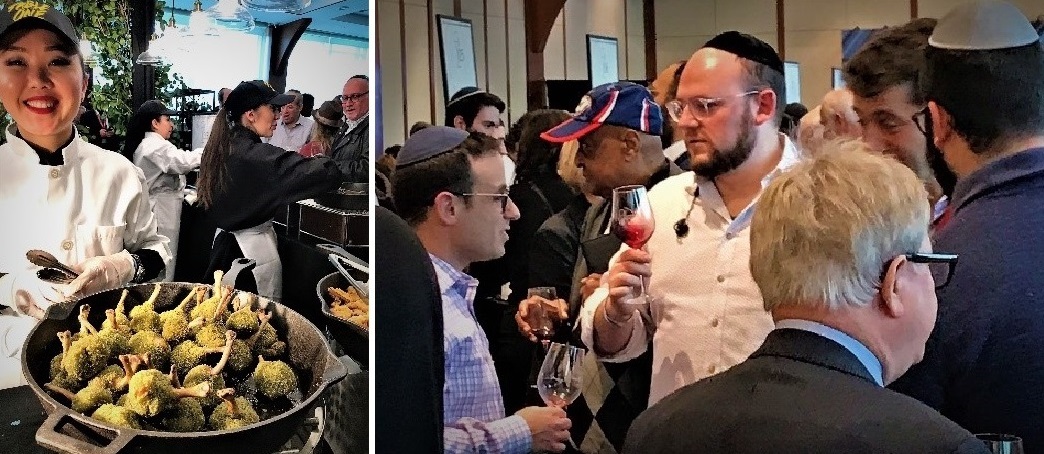
The Kosher Gourmet Dine-Drink Adventure
If there is one event in New York that should not be missed, it is the Kosher Food & Wine Experience sponsored by Royal Wine Corp. (aka Kedem). Over the past 13 years, Royal has provided the opportunity for thousands to taste, sip, and enjoy global Kosher cuisine, wines, and spirits, and the New York program presents a wonderful palate surprise at each vendor’s table.
Kosher? Not Kosher!
In Hebrew, Kashrush, from the root kosher Kasher, means suitable and/or PURE and therefore ensures fitness for consumption. The laws of Kashrus determine what is permitted and what is forbidden to eat.
Kosher foods fall into three groups: meat, dairy and pareve (foods that are neither meat nor dairy including eggs, fish, fruit, vegetables, grains, unprocessed juices, pasta, soft drinks, coffee and tea, candy and snacks). Food may lose its pareve status if processed on meat or dairy equipment or additives are used. Pure chocolate, cookies and other snacks may not be processed with meat or meaty foods unless they are certified pareve. Certain fruits, vegetables and grains must be checked for small insects and larvae because bugs are Not Kosher. Eggs must be checked for the presence of blood spots – also Not Kosher.
Kosher Wine Considerations
Kosher wine is made exactly the same way as all other wines; however, there is rabbinical supervision during the process and the wines are handled by Sabbath observant Jews. Gelatin, casein and bull blood are No No’s in the kosher wine-making process and fermentation can only be achieved from bacteria or kosher enzymes. Everything used for the harvest or in the processing of the grapes must be done under Rabbinical Supervision. All processing must follow the rules of Halacha (Jewish Religious Law). In the vineyard, no other plants may be cross-bred with the grapes (hybridization is another No No).
Beverages manufactured from grapes or grape-based derivatives can only be consumed if the grapes come from a kosher winery and prepared under strict Rabbinical Supervision.
Royal Wine Corp.
For over 70 years, Royal Wine Corp. has been the go-to enterprise for everyone looking for kosher wines, spirits and cuisine. The company started producing kosher grape juice and sacramental wine and under the guidance of the Herzog family became the world’s leading producer, distributor, and importer of award – winning kosher wines and spirits.
According David Herzog, the Chairman of the Board for Royal, “We’re not in the wine business, but in the simcha (joy) business.” Royal wines are found at bar/bat mitzvahs, birthdays, anniversaries, weddings and wherever a good glass of wine is welcomed and appreciated.
Kosher Wines Trends = Quality

According to Buchsbaum, a kosher wine guru who has been instrumental in expanding the growth and consumption of kosher wines for over 30 years, this wine segment has evolved over the decades. Consumers are gravitating to high-end Israeli wines and the French wine industry is increasing the number of wines in the kosher space. French chateaux leading the movement include Rothschild Drappier, Leoville, Grand Puy Ducasse and als Combes. From California, Herzog estate grown Chenin and Chardonnary and the Paso Robles Cabernet are being recognized for quality and value.
The ultra-orthodox Jewish community is also trading up and supporting the California kosher wine industry with Herzog filling this space.
Consumers trends show an interest in Bartenura Moscato, Baron Herzog and Herzog reserve plus the Israeli brands that include Castel Flam, Yatir and Shiloh.
Barenura is the largest selling imported Italian Moscato in the United States, with approximately 5,000,000 sold to both kosher and non-kosher wine consumers. It is very popular with millennials and hip-hop market segments.
The Experience
Over 2000 people attended the recent Kosher Food & Wine Experience held at Chelsea Piers in Manhattan. In excess of 1500 bottles were poured, representing 300 wines from major wine production regions of the world were represented, including a new Israeli produced wine line from NBA all-star Amare Stoudemire.

Kosher Food and More Food
In addition to wines and spirits, the array of kosher foods was extraordinary. Vendors from kosher restaurants, caterers and specialty food companies presented gourmet small bites that ranged from deconstructed falafel, to veal, duck, bison, wild mushrooms, cooked and raw fish, risotto, sushi, bourbon baked beans, and cinnamon buns adorned with imitation bacon (my favorite). Vendors included Great Falls Bistro, ALENbi Kitchen, Bison & Bourbon, Chani Greenbaum Events, Buffalo2go, Chop Chop, UN Plaza Grill & Sushi, Urban Pops, and West Wing.
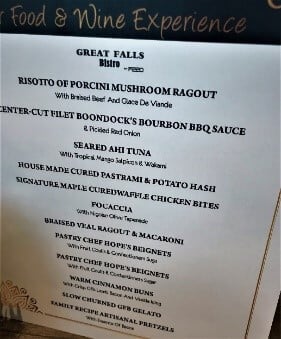
Great Falls Bistro, New Jersey
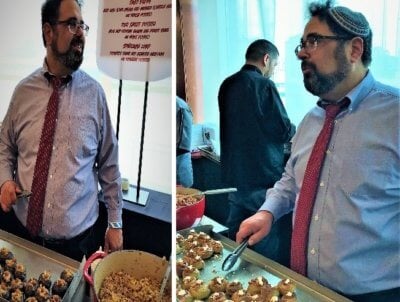



Kosher Spirits
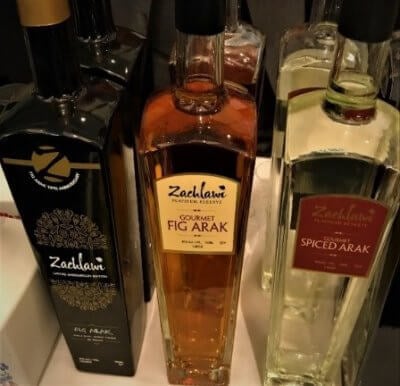
Zachlawi Fig Arak
Arak is a West Asian unsweetened distilled spirit (80-126 proof) in the anise drinks group. The word Arak is derived from the Arab word to perspire or sweat. It is clear, colorless, and unsweetened and usually based on grape neutral spirits (think Ouzo). The alcohol content may reach 95 percent if it is homemade according to Syrian, Israeli and Lebanese traditions.
Arak is made from grapes selected from mature vines that are usually golden in color. The vineyards are not irrigated but mature based on natural rain and sun. The grapes are harvested in late September and October, crushed and put in barrel with the juice and left to ferment for 3 weeks, stirred occasionally to release the CO2.
The still is usually made of stainless steel or copper. The alcohol collected in the first distillation undergoes a second distillation and mixed with aniseed (the ratio of alcohol to aniseed varies). The finished product is produced during a final distillation which takes place at very low temperatures.
For a quality arak, the finished spirit is aged in clay amphoras to allow the “angel’s share” to evaporate. The remaining liquid is ready for tasting.
There is only one Arak made with figs and Zachlawi delivers a gentle anise flavored experience with subtle hints of fruit and wood. Fig Arak is produced in small batches by hand with figs soaking in alcohol for 120+ days. The Zachlawi Distillery is based in New Jersey since 2004.
Arak is frequently served with mezza, raw meat dishes or barbecues and dishes flavored with Toum (garlic sauce).
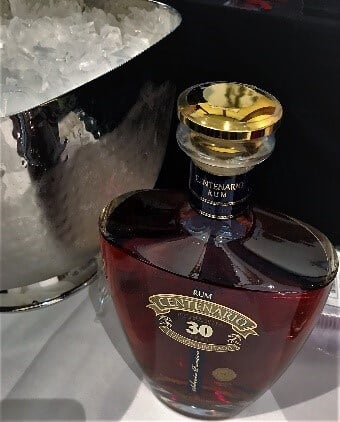
Ron Centenario Rum 30. Costa Rica
Centenario International started as a Costa Rican Rum distiller over 40 years ago. Today it is a division of Pernod-Ricard and produced in the Sistema solera ageing process.
The Solera system started in Spain with the objective of creating a consistent, reliable quality product based on the system used to age Spanish sherry. In Spanish, solera means “on the ground.” When it comes to ageing liquids, the barrels are organized in rows from the ground up, with the lowest layer of barrels containing the oldest liquid. The next row of barrels identified as “first criaderas” (or nurseries) contains the intermediate average age and the “second criaderas” is the highest level – in a 3-row arrangement, will contain the youngest average age liquid.
Centenario is made from sugar cane harvested in southern Guatemala, pressed into virgin sugar cane honey. The fermentation process uses a yeast strain isolated from pineapples to transform sugars within the honey into alcohol. The fermentation process takes approximately 5 days after which the fermented liquid is distilled in a single continuous column.
After distillation the rum is transported to the “House above the Clouds” in the Guatemalan mountains for maturation. Special cellars age the rum at an altitude of more than 7000 feet above sea level where the ambient temperature is much more stable and the oxygen levels are lower than at lower elevations. The more stable ambient temperature ensures that the ageing barrels are subject to less differential air pressure between the outside and inside of the barrel.
The complex rum presents as a honey/butterscotch palate experience, spicy and oaky with a raisin fruit finish that is long and smooth.

Zachlawi VDK Cold Brew. 60 proof. Kosher for Passover.
This 5x distilled vodka is blended with rich coffee from the mountains of Columbia. Micro distilling in small batch pot stills develops a handcrafted Russian-style vodka that offers hints of vanilla surrounding a rich taste of coffee.
For the next delicious and informative Kosher Wine/Dine event, go to thekfwe.com.
© Dr. Elinor Garely. This copyright article, including photos, may not be reproduced without written permission from the author.
